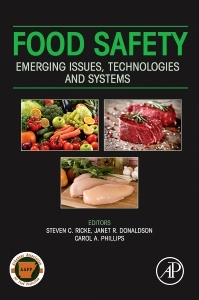Description
Food Safety
Emerging Issues, Technologies and Systems
Authors: Ricke Steven, Donaldson Janet R, Phillips Carol A
Language: English
Subject for Food Safety:
126.84 €
In Print (Delivery period: 14 days).
Add to cart464 p. · 19x23.3 cm · Hardback
Description
/li>Contents
/li>Readership
/li>Biography
/li>Comment
/li>
Food Safety: Emerging Issues, Technologies and Systems offers a systems approach to learning how to understand and address some of the major complex issues that have emerged in the food industry. The book is broad in coverage and provides a foundation for a practical understanding in food safety initiatives and safety rules, how to deal with whole-chain traceability issues, handling complex computer systems and data, foodborne pathogen detection, production and processing compliance issues, safety education, and more. Recent scientific industry developments are written by experts in the field and explained in a manner to improve awareness, education and communication of these issues.
Section 1: DEVELOPMENTS IN FOOD SAFETY TRACKING AND TRACEABILITY
1. Global food safety initiative: Implementation and perspectives
2. Computer systems for whole-chain traceability in beef production systems
3. Foodborne pathogen tracking in the produce environment
4. Application of molecular methods for bacterial traceability in food safety systems
5. A descriptive tool for tracing microbiological contaminations
6. Salmonella and the Potential Role for Microbial Process Indicators on Chicken Carcasses
Section 2: NEW STRATEGIES FOR STUDYING FOODBORNE PATHOGEN ECOLOGY
7. Strategies for understanding Salmonella ecology in food production
8. Listeria and omics approaches for understanding its biology
9. Current issues in foodborne Staphylococcus ecology
10. Shiga Toxin-Producing E. coli and ruminant diets: a match made in heaven?
11. Current perspectives on Campylobacter ecology
12. Arcobacter species- an emerging or emerged food pathogen?
13. The Cronobacter genus – an emergent bacterial pathogen comes of age in the genomic era
14. New and Emerging Food Pathogens
Section 3: NEW DEVELOPMENTS IN FOOD SAFETY EDUCATION – FOOD SYSTEMS AND TRAINING
15. Food Safety at Farmers Markets: Fact or Fiction?
16. Novel Approaches for Retail Food Safety Education
17. Approaches to Food Safety Education Among Critical Groups
18. The role of training strategies in food safety performance: Knowledge, behavior and management
19. Teaching Gastrointestinal Microbiology to a Food Safety Audience
20. Systems thinking and beef cattle production medicine – Issues of health and production efficiency
21. Food safety training and teaching in UK/Europe
A&G and Industry markets; industry professionals in food microbiology, food science meat science food safety and food production; government officials (USDA, FDA, etc.); grad students in agriculture and food science; corporate managers in food companies
- Examines effective control measures and molecular techniques for understanding specific pathogens
- Presents GFSI implementation concepts and issues to aid in implementation
- Demonstrates how operation processes can achieve a specific level of microbial reduction in food
- Offers tools for validating microbial data collected during processing to reduce or eliminate microorganisms in foods
These books may interest you

Foodborne Pathogens and Food Safety 184.47 €

Food Safety Engineering 242.64 €


